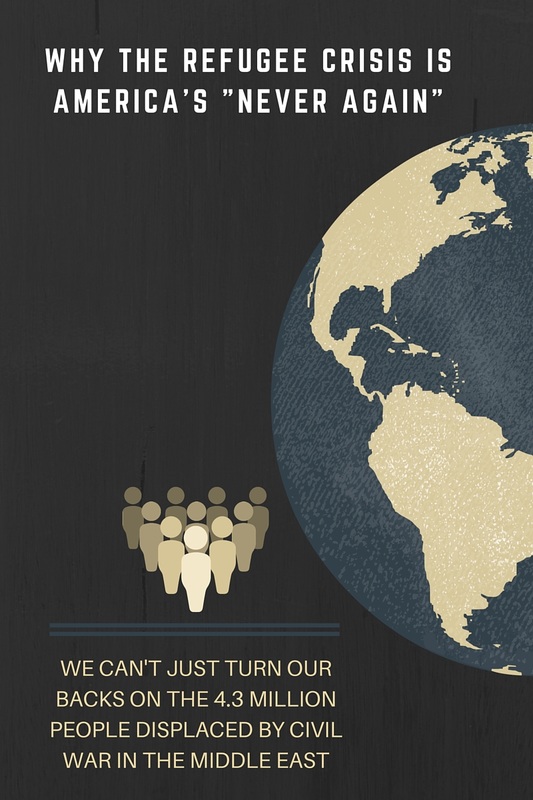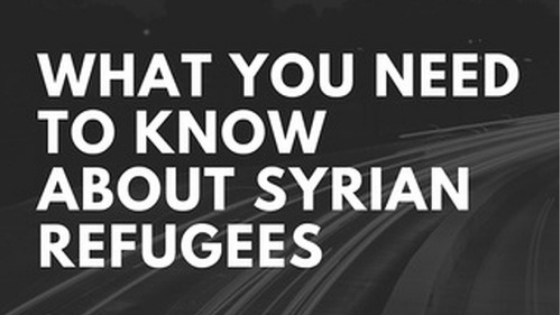|
by Nicole Dahlstrom Our Problems VS. Their Problems For the past few months, I’ve been keeping up with news about the refugee crisis and trying to do what I can to stay informed and sympathetic. I still feel as though I could do more, but I know that I am probably more informed about the subject than the majority of the population. So, the other day, I decided to test this hypothesis. While at work, I decided to ask one of my co-workers what she thought about the refugee crisis. As expected, she admitted that she knew very little about the crisis and so she did not really have much of an opinion about it. We went on talking about it for a while, and after I had explained a little more about what was going on and the severity of the crisis, she formed somewhat of an opinion. My co-worker decided that the struggles the refugees were facing were sad and that someone should definitely do something. It wasn’t surprising to me that my co-worker didn’t know much about what is being deemed the most significant humanitarian crisis since the Holocaust. Like many other Americans, she has distanced herself from news about chaos in other countries. It is easy to ignore the suffering of people from half a world away. There are always excuses that can be made as to why Americans don’t need to worry about global issues. Just last week, I listened to GOP frontrunner, Donald Trump, explain away his harsh policy on Syrian refugees. Trump, like my co-worker, agreed that something should be done for the refugees, but that the U.S. already had too many problems of its own to step in and take care of them. Donald Trump is not alone in this type of ‘closed borders’ thinking. Many Americans, along with other nations, share this closed-minded point of view. To them, problems occurring in other parts of the world are far away events happening to faceless, nameless masses. The reality that ‘closed borders’ advocates fail to realize is this: we are living in the most interconnected era in human history. A problem that occurs half way across the world is only seconds from becoming news on our T.V. screens, and only a short plane ride away from arriving at our borders. There is no such thing as our problems versus their problems. In this age of interconnectedness, we only have the world’s problems, and 4.3 Million people displaced by civil war, is a big world problem. The State of Things A. Trevor Thrall said it best in an article for the Atlantic, “Fourteen years after the invasion of Afghanistan and 12 years after the invasion of Iraq, neither nation is a safe place to live—both are themselves producing refugees in large numbers.” Trevor’s point is that the numerous U.S. military campaigns in the Middle East have actually played a large role in the present day conditions of instability we are seeing in these countries. By dismantling the centralized government in the Middle East, our military has left an opening for other power hungry groups to move in and attempt to take control. As these groups vie for power in a gruesome civil war, ISIS is seizing its opportunity to gain control and spread their ideology in the Middle East. Some would go as far as to claim that foreign intervention from countries like the U.S. is responsible for ISIS. Either way, the U.S. is not just an innocent bystander to the chaos occurring in the Middle East. The European Refugee Crisis Explained is a very useful informational video available on Youtube. In the video, we learn that a few million people are fleeing their homeland to escape the dangers of chemical warfare, mass execution, torture, and forced military enrolment. It is explained that all types of people are risking their lives on dangerous journeys to seek asylum. The video goes on to explain how border countries surrounding Syria have taken in the majority of those fleeing the chaos of civil war. In fact, 95% of refugees are living in these underdeveloped countries like Turkey, Jordan, and Lebanon. Overwhelmed and undersupplied, these countries are unable to offer the aid refugees are in desperate need of. Even the UN has been unable to make the refugee camps there habitable. With dire conditions in the refugee camps, many have decided to move on and seek asylum in the European countries that have the ability to provide better aid. Mass migrations to the European border countries have caused these countries to become overwhelmed as well. Up until recently, European policy was to require refugees to stay in the countries they arrived in. After realizing that this policy was unsustainable, the EU revised it, and finally decided to work together to come up with a 17 point action plan for handling the flood of refugees. Looking at these events, anyone could see the pattern. Desperate people flee their homeland and surrounding countries have no choice but to accept them. Overwhelmed, these countries are not able to help those refugees, and so again, these desperate people flee another bad situation. Now, surrounding countries have no option, just like the border countries, they have to accept the asylum seekers. The pattern is this: countries practically ignore the problem until it’s on their doorstep. Then, the chaos ensues as borders are flooded. At a time when the world should come together to solve a crisis, it becomes more divided than ever. We Said ‘‘Never Again’’ If this is the most significant humanitarian crisis since the Holocaust, then the question is, what happened to Never Again? Didn’t we pledge, as humane countries and peoples, to never let something so terrible happen again? Well, it seems that “Never Again” has come too soon, a mere 75 years after the end of World War II, and instead of learning from our past mistakes, we are letting the world’s problems fall on the shoulders of our allies and pledging to do almost nothing to help the crisis. There is no doubt that finding a solution to this crisis will be a complex, long term process. As a nation, and as Americans, we must take a lesson from history though. However you feel about president Obama, he made an excellent point during a 2013 Holocaust Remembrance speech. The president said, “‘Never again’ is a challenge to nations. It’s a bitter truth: Too often the world has failed to halt the killing of innocents on a massive scale and we are haunted by the atrocities that we did not stop and the lives we did not save.” Two years after this speech, America’s reaction to the current refugee crisis eerily resembles our reaction to Jewish refugees fleeing Germany. The State Department, along with American citizens, feared these refugees on the grounds that they could be spies for the Axis powers. We played it safe, and hundreds of refugees suffered as a result. Today, a similar fear drives us to turn away Syrian refugees, even though, as David Bier, Director of Immigration Policy at Niskanen Center puts it, “of the millions of refugees admitted in the U.S. in the past several decades, including hundreds of thousands from the Middle East, none of them has ever successfully completed an act of terrorism in the United States.” So, although admitting hundreds of thousands of refugees in an expedited process would pose valid concerns to our nation’s security, we must not let that be an excuse to turn our backs on the innocents we promised to protect when we said, “Never Again.” References
Related ArticlesRelated Books
2 Comments
najem
11/27/2015 11:59:17 am
please i want to go to with my family to canada, i like to live in canada i am a syrian please try to help us to move to canada if you can
Reply
Paul
1/12/2016 03:32:30 am
Muslim men are raping German women. That is the thanks the Germans got. Google it!!
Reply
Leave a Reply. |
- Home
- Stories
-
Internship
- Summer 2024 Internship
- Summer 2023 Internship
- Fall 2022 Internship
- Summer 2022 Internship
- Summer 2021 Internship
- Fall 2020- Spring 2021 Internship
- Summer 2020 Internship
- Fall 2019 Internship
- Summer 2019 Internship >
- School Year 2018-2019 Internship
- Summer 2018 Internship >
- Fall 2017 Internship
- Summer 2017 Internship >
- Books
- Archives
-
Resource Page
-
Supplementary Research Guides
>
- Unit 731 - Guide >
-
Philippines' Resistance - Guide
>
- Philippines World War II Timeline
- The Japanese Invasion & Conquest of the Philippines
- Bataan Death March
- Formation of Underground Philippines Resistance
- Supplies of the Guerrilla Fighters
- The Hukbalahap
- Hunter's ROTC
- Marking's Guerrillas
- United States Army Forces in the Philippines of Northern Luzon (USAFIP-NL)
- The Aetas
- Chinese and Filipino-Chinese Nationalist Guerrilla Units
- The Female Faces of the Philippine Guerrillas
- Rising Sun Flag - Guide >
- Pinay Guerrilleras - Guide >
- Fall of Singapore - Guide >
- Three Years and Eight Months - Guide >
- Siamese Sovereignty - Guide >
- The Khabarovsk War Crimes Trial - Guide >
- Unit 731 Cover-up : The Operation Paperclip of the East - Guide >
- Marutas of Unit 731 - Guide >
- Prince Konoe Memoir - Guide >
- Competing Empires in Burma - Guide >
- Battle of Shanghai - Guide >
- Ishi Shiro - Guide >
- Taiwan The Israel of the East - Guide >
- Seeking Justice for Biological Warfare Victims of Unit 731 - Guide >
- Rice and Revolution - Guide >
- Clash of Empires - Guide >
-
Hunger for Power and Self-SufficiencyI - Guide
>
- The Influence of War Rations on Post-War Culinary Transformations
- How World War II Complicated Food Scarcity and Invention
- American Military Innovations
- Government-Sponsored Food Inventions in Europe during World War II
- Feeding the Army: The Adaptation of Japanese Military Cuisine and Its Impact on the Philippines
- Mixed Dishes: Culinary Innovations Driven by Necessity and Food Scarcity
-
Denial A Quick Look of History of Comfort Women and Present Days’ Complication - Guide
>
- The Comfort Women System and the Fight for Recognition
- The Role of Activism and International Pressure
- The Controversy over Japanese History Textbooks
- The Sonyŏsang Statue and the Symbolism of Public Memorials
- Activism and Support from Japanese Citizens
- The Future of Comfort Women Memorials and Education
- Echoes of Empire: The Power of Japanese Propaganda - Guide >
- Lesson Plans >
-
Supplementary Research Guides
>
|
Pacific Atrocities Education
730 Commercial Street San Francisco, CA 94108 415-988-9889 |
Copyright © 2021 Pacific Atrocities Education.
We are a registered 501 (c)(3) charity. |
- Home
- Stories
-
Internship
- Summer 2024 Internship
- Summer 2023 Internship
- Fall 2022 Internship
- Summer 2022 Internship
- Summer 2021 Internship
- Fall 2020- Spring 2021 Internship
- Summer 2020 Internship
- Fall 2019 Internship
- Summer 2019 Internship >
- School Year 2018-2019 Internship
- Summer 2018 Internship >
- Fall 2017 Internship
- Summer 2017 Internship >
- Books
- Archives
-
Resource Page
-
Supplementary Research Guides
>
- Unit 731 - Guide >
-
Philippines' Resistance - Guide
>
- Philippines World War II Timeline
- The Japanese Invasion & Conquest of the Philippines
- Bataan Death March
- Formation of Underground Philippines Resistance
- Supplies of the Guerrilla Fighters
- The Hukbalahap
- Hunter's ROTC
- Marking's Guerrillas
- United States Army Forces in the Philippines of Northern Luzon (USAFIP-NL)
- The Aetas
- Chinese and Filipino-Chinese Nationalist Guerrilla Units
- The Female Faces of the Philippine Guerrillas
- Rising Sun Flag - Guide >
- Pinay Guerrilleras - Guide >
- Fall of Singapore - Guide >
- Three Years and Eight Months - Guide >
- Siamese Sovereignty - Guide >
- The Khabarovsk War Crimes Trial - Guide >
- Unit 731 Cover-up : The Operation Paperclip of the East - Guide >
- Marutas of Unit 731 - Guide >
- Prince Konoe Memoir - Guide >
- Competing Empires in Burma - Guide >
- Battle of Shanghai - Guide >
- Ishi Shiro - Guide >
- Taiwan The Israel of the East - Guide >
- Seeking Justice for Biological Warfare Victims of Unit 731 - Guide >
- Rice and Revolution - Guide >
- Clash of Empires - Guide >
-
Hunger for Power and Self-SufficiencyI - Guide
>
- The Influence of War Rations on Post-War Culinary Transformations
- How World War II Complicated Food Scarcity and Invention
- American Military Innovations
- Government-Sponsored Food Inventions in Europe during World War II
- Feeding the Army: The Adaptation of Japanese Military Cuisine and Its Impact on the Philippines
- Mixed Dishes: Culinary Innovations Driven by Necessity and Food Scarcity
-
Denial A Quick Look of History of Comfort Women and Present Days’ Complication - Guide
>
- The Comfort Women System and the Fight for Recognition
- The Role of Activism and International Pressure
- The Controversy over Japanese History Textbooks
- The Sonyŏsang Statue and the Symbolism of Public Memorials
- Activism and Support from Japanese Citizens
- The Future of Comfort Women Memorials and Education
- Echoes of Empire: The Power of Japanese Propaganda - Guide >
- Lesson Plans >
-
Supplementary Research Guides
>






